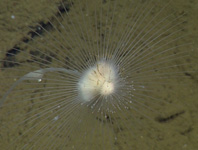Abstract
Two new species of Biguembia Szumik (B. mirador n. sp. and B. troncol n. sp.) and one new species of Gibocercus Szumik (G. podamita n. sp.) from Brazil are described and illustrated. The female of Gibocercus chaco Szumik is described for the first time. Female terminalia of both genera are redefined and redescribed for B. copo, G. chaco and G. beni. Additionally, a cladistic analysis using almost 100 morphological characters was developed. Both genera appear monophyletic and well supported by several synapomorphies. The results also indicate that some species are unjustified and therefore they are synonymized: Gibocercus magnus Ross, 2001 = Gibocercus beni Szumik, 1997; Gibocercus flavipes Ross, 2001 = Gibocercus nanai Szumik, 1997; Gibocercus napoa Ross, 2001 = Gibocercus sandrae Ross, 2001, all new synonymies. The relationships of the new species are discussed as well as the potentiality of female traits.
References
Klass, K. & Ulbricht, J. (2009) The female genitalic region and gonoducts in Embioptera (Insecta), with general discussion on female genitalia in insects. Organism, Diversity and Evolution, 9, 115–154.
https://doi.org/10.1016/j.ode.2009.01.002Goloboff, P. (1999) Analyzing large data sets in reasonable times: solutions for composite optima. Cladistics, 15, 415–428.
https://doi.org/10.1111/j.1096-0031.1999.tb00278.xGoloboff, P. & Farris, J. (2002) Methods for quick consensus estimation. Cladistics, 17, 26–34. [S26–S34]
Goloboff, P., Farris, J. & Nixon, K. (2003a) TNT: Tree Analysis using New Technology. Program and documentation. Available from the authors. Available from: http://www.lillo.org.ar/phylogeny/tnt/ (accessed 26 July 2017)
Goloboff, P., Farris, J., Kallersjo, M., Oxelman, B., Ramirez, M. & Szumik, C. (2003b) Improvements to resampling measures of group support. Cladistics, 19, 324–332.
DOI: 10.1111/j.1096-0031.2003.tb00376.xGoloboff, P., Farris, J. & Nixon, K. (2008) TNT, a free program for phylogenetic analysis. Cladistics, 24, 774–786.
DOI: 10.1111/j.1096-0031.2008.00217.xGoloboff, P. & Catalano, S. (2016) TNT version 1.5, including a full implementation of phylogenetic morphometrics. Cladistics, 32, 221–238.
https://doi.org/10.1111/cla.12160Ross, E.S. (2001) The Embiidae of the Americas (order Embiidina). Embia, Part 3. Occasional Papers of the California Academy of Sciences, 150, 1–86.
Szumik, C. (1991) Two new species of Teratembiidae (Embiidina) from Argentina. Journal of the New York Entomological Society, 99, 611–621.
Szumik, C. (1996) The higher classification of the Order Embioptera: A cladistic analysis. Cladistics, 12, 41–64.
https://doi.org/10.1111/j.1096-0031.1996.tb00192.xSzumik, C. (1997) Two new neotropical genera of Embiidae (Embioptera, Insecta). Journal of the New York Entomological Society, 105, 140–153.
Szumik, C. (2002) Embioptera. In: Llorente Bousquets, J. & Morrone, J.J. (Eds.), Biodiversidad, taxonomía y biogeografía de artrópodos de México: hacia una síntesis de su conocimiento. Capítulo 23. UNAM (Universidad Nacional Autónoma de México), Mexico City, pp. 441–448.
Szumik, C. (2004) Phylogenetic systematics of Archembiidae (Embiidina, Insecta). Systematic Entomology, 29, 215–237.
https://doi.org/10.1111/j.0307-6970.2004.00239.xSzumik, C. (2012) Embioptera. In: Rafael, J.A., Melo, G.A.R. Carvalho, C.J.B., Casari, A.S. & Constantino, R. (Eds.), Insectos do Brasil, Diversidade e Taxonomia. Holos Editora, Ribeirao Preto, SP, pp. 263–269.
Szumik, C., Edgerly, J. & Hayashi, C. (2008) Phylogeny of embiopterans (Insecta). Cladistics, 24, 993–1005.
https://doi.org/10.1111/j.1096-0031.2008.00228.x

